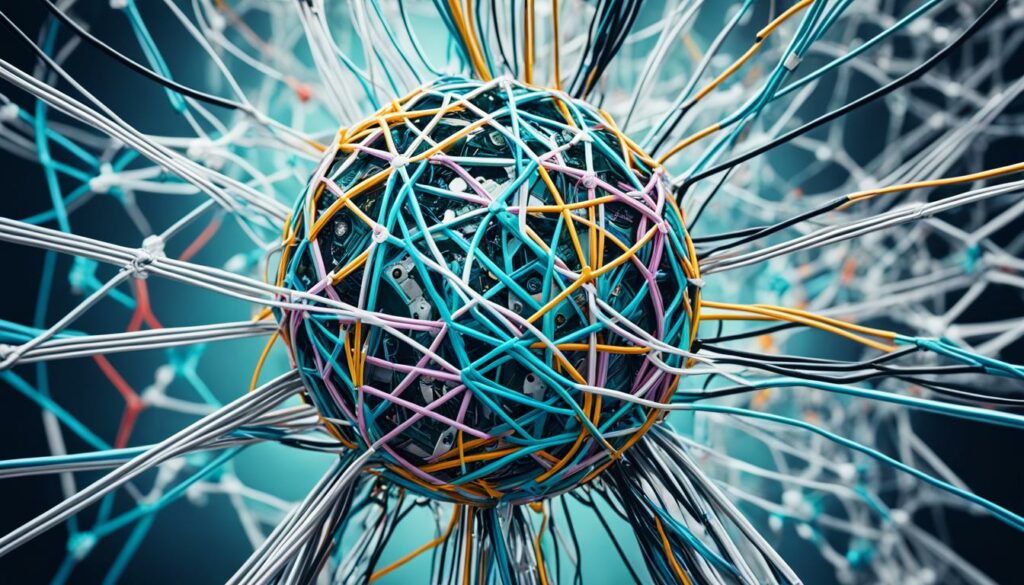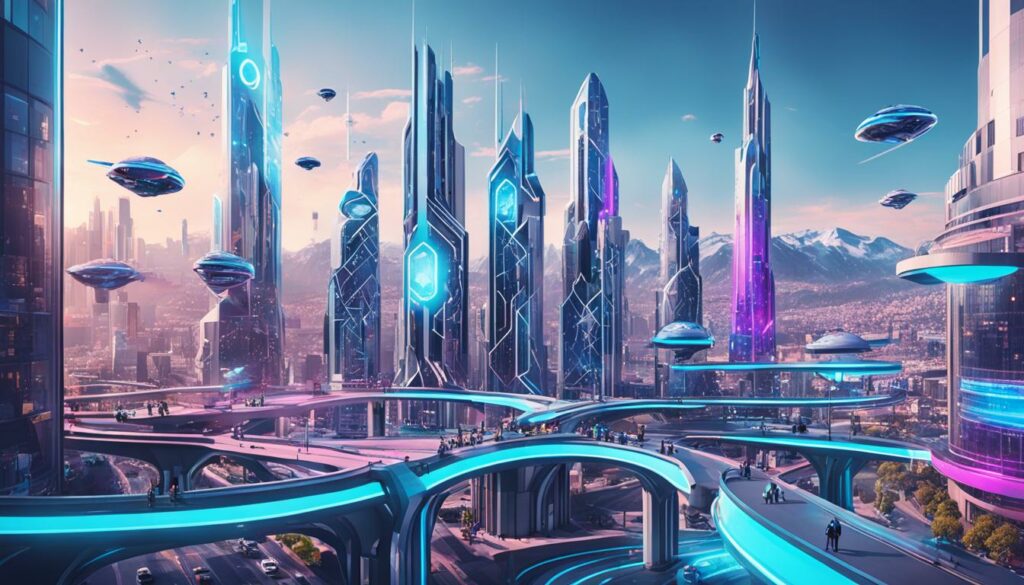In today’s fast-changing tech world, a new kind of smart software is coming to life. These are called autonomous AI agents. They can work on their own, make choices, and act without needing a human to tell them what to do. These AI agents are like self-thinking systems that see their world, understand data, and change how they act to meet goals.
These tools powered by AI are changing many fields, like healthcare, transport, finance, and making things. They automate tasks, offer services just for you, and solve hard problems. This is making things more efficient and opening up new possibilities.
Key Takeaways:
- Autonomous AI agents are smart software that can work by themselves without needing a human to help.
- These AI agents can see their world, look at data, and change how they act to reach goals.
- They’re changing industries by automating tasks, offering services just for you, and solving tough problems.
- It’s important to know what these AI agents can do to use their power in different areas.
- There are big questions about how safe, trustworthy, and right it is to use these advanced AI agents.
Understanding Autonomous AI Agents
In the world of artificial intelligence (AI), the idea of autonomy is big news. Autonomous AI agents are smart software systems that can decide and act on their own. They don’t need constant human help or control. These agents show amazing self-control, flexibility, and focus on goals.
Defining Autonomy in AI Systems
Autonomy in AI means an agent can see its world, think, and make choices to reach its goals without always needing human help. These AI agents work pretty much on their own. They can change how they act based on new situations and react quickly to what’s happening.
Key Characteristics of AI Agents
What makes autonomous AI agents stand out is their special traits. These include:
- Self-Governance: These agents can decide and act without needing humans to tell them what to do all the time.
- Adaptability: They can adjust to new situations and change how they behave and make choices.
- Goal-Oriented Behavior: These agents aim for specific goals and use their smart thinking to get through tough situations.
- Perception and Information Processing: They can collect and understand data from their environment to help them decide and act.
Knowing what makes autonomous AI agents special helps us see how they could change many industries and uses.
“Autonomous AI agents are set to change how we use technology. They’re leading the way to a future where smart systems can work almost on their own.”
The Role of Autonomous AI Agents
Autonomous AI agents are changing how industries work. They automate tasks and let humans focus on strategy. These AI systems are key to making things more efficient, better decisions, and improving user experiences in many areas.
Autonomous AI agents are great at automation. They do repetitive, time-consuming tasks fast and accurately. This frees up people to work on harder challenges. They’re making businesses run smoother, from managing supply chains to helping with customer service.
These agents also help with AI-driven decision making. They look at lots of data to find patterns and predict outcomes. This gives humans better insights to make smarter choices, leading to better results for businesses.
Autonomous AI agents also make personalized experiences for users. They learn and adapt to give users what they like, making things more fun and satisfying.
“Autonomous AI agents are the future of intelligent automation, empowering organizations to streamline operations, enhance decision-making, and deliver personalized experiences at scale.”
As autonomous AI agents grow in importance, businesses need to keep up. By using these self-governing AI systems, companies can get more efficient, innovative, and make customers happier.
Types of Autonomous AI Agents
In the world of autonomous AI, there are two main types: reactive agents and deliberative agents. The choice depends on the task and how much autonomy is needed.
Reactive Agents
Reactive AI agents react to what’s happening around them right away. They don’t think deeply or plan ahead. These agents are great for tasks that need quick thinking and fast action. Examples include navigating, avoiding obstacles, and controlling systems in real-time.
Deliberative Agents
Deliberative agents make decisions with more thought. They plan and reason to reach their goals. These AI agents use models, knowledge, and thinking to make long-term plans. They’re used for tasks that need smart thinking, like planning, solving problems, and making decisions when things are uncertain.
| Characteristic | Reactive Agents | Deliberative Agents |
|---|---|---|
| Reasoning | Simple, reactive | Complex, goal-oriented |
| Decision-making | Immediate, real-time | Deliberative, strategic |
| Autonomy | High in specific tasks | Flexible, adaptable |
| Applications | Navigation, control systems | Planning, problem-solving |
Choosing between reactive and deliberative agents in autonomous AI depends on the task’s needs. It also depends on how much autonomy and complex decision-making is wanted.
Autonomous AI Agents and Machine Learning
Autonomous AI agents use advanced machine learning, like reinforcement learning, to get better and adapt. This mix lets them learn from their actions and change their ways to do better over time.
Reinforcement Learning for Agent Autonomy
Reinforcement learning helps AI agents learn by trying things and seeing what happens. They get feedback, good or bad, for their actions. This way, they try out different ways to do things, see what works, and get better at it.
This self-learning is key for making AI systems that can handle new and changing situations on their own. By using reinforcement learning, AI agents can make smarter choices, see what might go wrong, and find new ways to solve problems. This makes them more independent and able to tackle tough challenges.
“Autonomous AI agents that utilize reinforcement learning can navigate complex environments, make informed decisions, and continuously improve their performance through real-world interactions.”
The link between autonomous AI and machine learning, especially reinforcement learning, is vital for the future of AI. It will help unlock new levels of AI autonomy and smart behavior.
Applications of Autonomous AI Agents
Autonomous AI agents are changing many industries. They make businesses work better and more efficiently. These systems are used in many areas, like healthcare, transportation, manufacturing, and finance.
In healthcare, these AI agents help with personalized medicine. They work on finding new drugs, diagnosing diseases, and giving treatment plans. They use big data and smart analysis to make smart choices.
The transportation world is also using these AI agents. They help make self-driving cars, plan the best routes, and make logistics safer and more efficient. This is making transportation more sustainable and smart.
In manufacturing, these AI agents make production smoother with robotic automation. They do repetitive tasks, check on equipment, and predict when things need fixing. This means more work gets done, and there are fewer mistakes.
| Industry | Application of Autonomous AI Agents |
|---|---|
| Healthcare | Drug discovery, disease diagnosis, personalized treatment recommendations |
| Transportation | Self-driving vehicles, route optimization, logistics optimization |
| Manufacturing | Robotic process automation, predictive maintenance, quality control |
| Finance | Fraud detection, portfolio optimization, personalized investment recommendations |
| Consumer Services | Personalized recommendations, chatbots, customer service automation |
In finance, these AI agents are changing how banks and other financial places work. They find fraud, improve investment plans, and give advice tailored to you. This makes decisions better and helps manage risks.
These AI agents are also changing consumer services. They give personalized tips, work as smart chatbots, and make customer service better. This makes customers happier and helps businesses grow.
Autonomous AI agents are amazing in how they can be used in many areas. Their use is growing, changing how we live and work. As AI keeps getting better, we’ll see even more new and exciting uses of these systems.
Challenges in Developing Autonomous AI Agents
As we move forward with autonomous AI agents, we face new challenges. Ensuring their safety and building trust in their decisions are key. These systems can greatly affect people’s lives and businesses.
Safety and Trust Considerations
Ensuring autonomous AI agents are safe and reliable is a big task. They can impact people and businesses a lot. So, we must find ways to reduce risks and fix vulnerabilities.
We need to test these systems a lot to make sure they’re safe. This protects users and the public from harm. Trust in autonomous AI systems is also crucial for their use. People need to believe these systems make fair and reliable decisions.
- Ensuring the safe and secure operation of autonomous AI agents is a top priority.
- Fostering trust in the decision-making capabilities of autonomous systems is vital for their acceptance and adoption.
- Transparency and accountability measures are crucial in building trust in autonomous AI agents.

Overcoming these challenges in developing autonomous AI agents will take a team effort. We need developers, policymakers, and users working together. By focusing on safety and trust, we can make the most of these agents. This will help them fit well into different industries and uses.
“The development of autonomous AI agents must be accompanied by a strong emphasis on safety, security, and trust to ensure their successful and responsible adoption.”
Autonomous AI Agents: The Future of AI
Artificial intelligence (AI) is evolving fast, and autonomous agents are becoming key to its future. These systems will get smarter, more flexible, and trustworthy. This will lead to more automation, personalization, and smart decision-making in many areas.
Advanced machine learning algorithms are a big step forward for autonomous AI agents. With reinforcement learning, they can learn and adapt by themselves. This makes them better at handling changing situations and meeting user needs. It also means they can take on more tasks, changing how we use technology.
Autonomous AI agents will do more than just automate tasks in the future. They will be vital in areas like personal assistants, smart transport, and complex decision-making. As we trust these agents more, they will fit smoothly into our lives, making a big impact.
For autonomous AI agents to reach their full potential, we must tackle safety, security, and transparency issues. It’s important to design these systems with strong safety measures and ethical rules. This balance between innovation and responsibility will shape a bright future for autonomous AI agents.
“The future of AI is in autonomous systems that can adapt and learn on their own, transforming the way we interact with technology and solve complex problems.”
The role of autonomous agents will grow as AI advances. They will use machine learning and smart decision-making for more automation, personalization, and problem-solving. While we face challenges like safety and trust, the potential of autonomous AI agents to shape the future is clear.
The Autonomous AI Agents Landscape
The world of autonomous AI agents is changing fast. Many companies and research groups are leading this change. They are making intelligent systems that can work on their own. Tech giants, startups, and top universities are working on these systems for many industries.
At the center, we see leading companies in autonomous AI. Giants like Google, Microsoft, and Amazon are improving their AI systems. They use advanced machine learning and lots of data for smart decisions and flexible actions. Meanwhile, startups like Anthropic, Vicarious, and DeepMind are trying new things. They aim to change the future of AI.
Industry trends in AI autonomy are also shaping the future. We’re focusing more on ethical AI, using new learning methods, and making AI easier to understand. These trends are driving new ideas and changing the path of autonomous agents. As we move forward, autonomous AI will change many areas, from transport to healthcare.

“The future of artificial intelligence lies in the seamless integration of autonomous agents that can adapt, learn, and make decisions independently, transforming the way we interact with technology.”
The autonomous AI agents landscape is always changing. This brings us exciting and big changes for the future. With self-managing AI, we’re on the edge of new possibilities. We’re looking at a future where AI and humans work together to solve big problems and innovate.
Conclusion
Autonomous AI agents are changing how we use technology and solve big problems. They bring more automation, personalization, and better decision-making. As they get better, they will change many industries and how we live and work.
Autonomous AI is very important. It can make us more productive, improve processes, and offer solutions just for us. Making sure these AI systems are reliable, adaptable, and trustworthy is key for their success.
The future of autonomous systems is bright. As AI and machine learning get better, these agents will handle complex tasks, make smart choices, and adjust to new situations. This will lead to new breakthroughs in many areas, like transportation, healthcare, and manufacturing.

